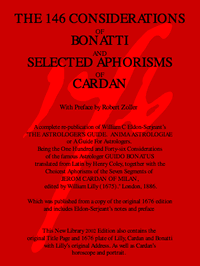Bonatti & Cardan: Astrologer's Guide, 146 Considerations
THE ASTROLOGER'S GUIDE. ANIMA ASTROLOGIAE or A Guide For Astrologers.
Being the One Hundred and Forty-six Considerations of the famous Astrologer GUIDO BONATUS translated from Latin by Henry Coley, together with the Choicest Aphorisms of the Seven Segments of JEROM CARDAN OF MILAN, edited by William Lilly (1675)
For three hundred years this book provided for the English-speaking world the only access to a legacy left by two of the world's greatest astrologers. This was during a time when not only astrology was in decline but when those who had the necessary skills to tap its fountainhead were also diminished. Thus as the centuries wore on this little book became increasingly important.
It was the last book produced by William Lilly, one of the most distinguished of English astrologers. His pupil and adopted son Henry Coley translated its Latin works. Lilly edited the translations adding his own notes.
By the 1880's Lilly's 1676 publication was exceedingly rare and so another English astrologer, the well-known theosophist, William C Eldon-Serjeant re-published the work in 1886. He added further notes and a new Preface, which generally enrich the work, making it superior to the 1676 edition. Though it should be noted that the engraved portraits of Lilly, Cardan and Bonatti were omitted from the 1886 edition. Later editions (including those of the AFA and Regulus, and as sold by Kessinger, Justus and Ascella) repeated this omission and reduced the publication by a further 40 pages (being the Redway publications supplement).
This New Library edition restores the missing engraving and the missing supplement. It also includes additional pages showing the 1676 title page and Lilly's Address both in their original seventeenth century 8vo format. As well as Cardan's original horoscope (as published and used by himself) accompanied by notes and several portraits. To this is added a Preface byRobert Zoller, the most renowned modern proponent of Bonatti and an Introduction. This makes it the most complete and comprehensive edition yet produced.
The 146 Considerations of Bonatti (died c. 1300) represent only a small fraction of the immense work of this outstanding author who was the most successful and distinguished astrologer of the thirteenth century. The Considerations are taken from the Tractatus Quintus of his Liber Astronomiae, which Thorndike describes as "The most important astrological work produced in Latin in the 13th century." The next person after Coley to translate Bonatti into English was Robert Zoller. Some of these later translations are now also available Bonatti on War, Bonatti on Arabic Parts with more being released shortly (for updates please add your name to the email list. Special notefor Diploma Medieval Astrology (DMA) students concerning Cardan.
The Considerations provide a wealth of knowledge for the practising astrologer — both in matters of horary and natal judgment. The scope is very wide ranging from fixed stars, void-of-course moon, declensions, retrograde motions, how to deal with late degree (post 29° ) positions, eclipses, combustion, nodes and more, making it a highly valuable work.
By having it published in English, thus making it more widely available, Lilly was demonstrating its importance and underlining the faith that he held in it. Now over three centuries later an increasing number of modern astrologers are agreeing with Lilly as they too conclude that the knowledge conveyed by Bonatti is essential for the proper practise of astrology and that it is ignored at the astrologer's peril.
Girolamo Cardano (in Italian), Jerom(e) Cardan of Milan (in English), Hieronomus Cardanus (in Latin) (1501 —1576) was the leading astrologer in the century before Lilly. Eldon-Serjeant gives a good account of Cardan's life in his 1886 preface (drawing on Morley's The Life of Girolamo Cardano 1854 edition and Cardan's own De vita propria liber — The Book of My Life) and allows some valuable insights into his extraordinary character.
Coley and Lilly selected and carefully organised some of his aphorisms so as to give the greatest practical benefit to the practising astrologer. Though Cardan wrote them over four centuries ago, they remain as pertinent today as they were then. Indeed, those who are of a mind to ignore old texts and attempt to look anew would do well to meditate on these Aphorisms before embarking down a separate path of the astrological maze.
The 245 Aphorisms cover a wide variety of subjects from germane general advice to particular direction concerning nativities, elections, revolutions (including solar and lunar returns), disease, eclipses and comets, weather, earthquakes, war, husbandry and more.
Like the Considerations the Aphorisms are meant only for guidance — thus the book's name TheAstrologer's Guide. However, those astrologers who take the trouble to test its contents will be well rewarded for their efforts. To the discerning astrologer it will be evident that much truth is to be found, unaltered by time. And so it will soon become apparent why Lilly chose these particular works as his final legacy to us from the great mass of writings at his disposal.
Note: Those who have read Guardian Angels and Astrology and Angels and those who have completed the Courses should find Eldon-Serjeant's Preface of particular interest. Cardan made frequent reference to his own Angel, being his constant companion and guide. As to the nature of his Angel, the application of the astrological formula given in the Diploma Course should be applied to Cardan's nativity (included in the New Library edition of The Astrologer's Guide) as it will be most instructive to the student.
Customer Reviews
I did not read this book until after I had finished the Foundation course. Mistake. Would recommend that students get a copy early on in their studies and read at least the first 20 considerations of Bonatti. At first they do not seem to make a lot of sense, but as you work through the course materials the penny drops. This work is like a treasure-trove. An 800 year-old treasure just waiting to be discovered.







